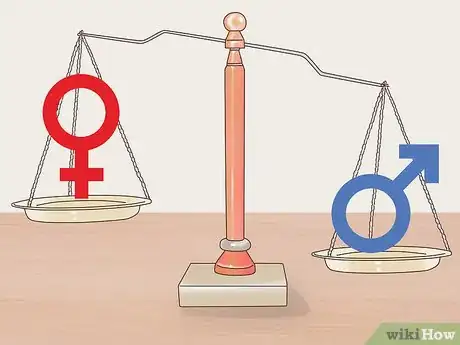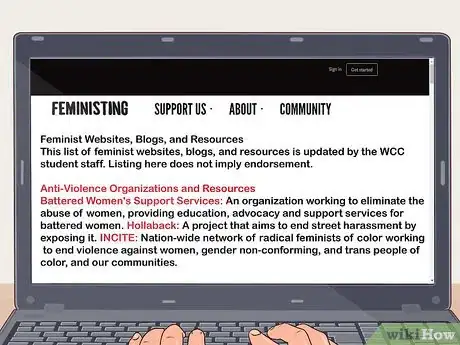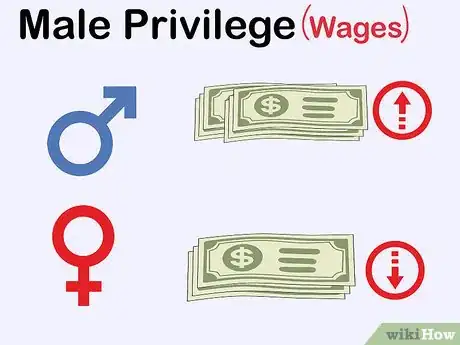This article was co-authored by Asa Don Brown, PhD, DNCCM, FAAETS. Dr. Asa Don Brown is a Clinical Psychologist with over 25 years of experience. He specializes in working with families, children, and couples, treating a variety of psychological disorders, trauma, and abuse. Dr. Brown has specialized in negotiation and profiling. He is also a prolific author having published three books and numerous articles in magazines, journals, and popular publications. Dr. Brown earned a BS in Theology and Religion with a minor in Marketing and an MS in Counseling with a specialization in Marriage and Family from The University of Great Falls. Furthermore, he received a PhD in Psychology with a specialization in Clinical Psychology from Capella University. He is also a candidate for a Masters of Liberal Arts through Harvard University. Dr. Brown is a Fellow of the American Academy of Experts in Traumatic Stress and a Diplomate for the National Center for Crisis Management and continues to serve a number of psychological and scientific boards.
This article has been viewed 75,830 times.
The feminist movement focuses on the need for action to achieve equality of the sexes and other gender identities.[1] While it originally set out to advocate for women’s rights in the workplace, it has now become a beacon advocating for the rights of all individuals. Feminism is the idealistic perspective that every individual has a right to equality. If you are a heterosexual man, you may find it difficult to support the women around you and your female romantic partners. As feminism continues to evolve and become more mainstream, many men are identifying as feminists and are taking the necessary steps to act as allies for women in their day-to-day lives.[2]
Steps
Reading Up on Feminist Issues
-
1Understand the two major definitions of feminism. Feminism has several possible definitions, depending on which school of thought you reference. However, the two main definitions of feminism are:[3]
- Feminism is a movement by women for women. This means that feminists are women who are working to better the lives of other women. There can be different types of feminism that represent different female groups in society, from African American women to trans women, but the basis of the movement is for and by women. Men can act as allies to women and work with women to demonstrate their support of the movement but they are not a dominant force in the movement.
- Feminism is a movement about gender justice. This means that feminism works against the system of oppression we live in, which affects women as well as other non-binary individuals (or individuals who are not straight men). In this approach to feminism, people of all genders can be feminists as long as they are willing to work to dismantle the system of oppression that we currently live in.
-
2Be aware of the role of patriarchy in our society. A big part of being a feminist is understanding that as individuals we live in a patriarchal society. This means that society is based on a system of customs and rules that are created by heterosexual men for heterosexual men. As a result of the patriarchal system, individuals who are not heterosexual men (including women) are discriminated against or are not given fair treatment.[4]
- Recognizing that we exist in a patriarchal society will allow you to better understand the need for feminism and for movements to work against the existing patriarchy. Just because feminism works against the effects of patriarchy does not mean feminists hate all men. Instead, men can be seen as allies to women in the fight against patriarchy. The support of men in the feminist movement will ultimately benefit people of all genders.
Advertisement -
3Read feminist blogs and websites. Educate yourself on a daily basis by integrating feminist blogs and websites into your internet reading routine. Rather than click on the standard news and opinion sites, seek out websites and blogs that address current news and issues from a feminist perspective. You can also learn through watching videos on the subject. This will allow you to access the perspective of feminists and support them by reading what they have to say.[5]
- There are several well known feminist blogs and websites online that are updated regularly. Many of these blogs are written by women for women, but are of course, accessible for men, too.
-
4Subscribe to feminist publications. You can also throw financial support behind feminist issues by subscribing to feminist publications. Many of these publications have low subscription fees and appeal to a wide readership, with articles on pop culture and political issues from a feminist perspective.
- Look for feminist magazines, such as Bitch Magazine or BUST Magazine, at your local bookstore, magazine stand, or at your local library. You can also subscribe to these magazines online.[6]
Having Supportive Discussions with Feminists
-
1Acknowledge your male privilege. Male privilege is the result of the patriarchal system we live in, where men are given more power and privilege than women.[citation needed] This means that as a man, you likely will earn higher wages than women, have a lower risk of sexual assault and sexual violence, and have access to financial and social support that is not extended to women. Because you benefit from male privilege as a man, it is important that you acknowledge this privilege in your discussions with feminists.[7]
- This concept is also known as “checking your privilege”, where you recognize and acknowledge your male privilege before you respond to a woman who is speaking to you or to women that are in a shared space with you. This will allow you to keep in mind where you are coming from in relation to feminism and to be a positive ally to women.
-
2Practice active listening when a woman explains her perspective. As a male feminist, it is important that you focus on actively listening to women when they speak. This will show you are aware that women are the leaders in the feminist movement and that you are a supporting player in the movement. Though you may be used to asserting yourself in discussions with others, it is essential that you actively listen to women in discussions on feminism.[8]
- For example, perhaps you are in a conversation with a woman who identifies as a feminist. She may make a comment about the need for safe spaces for women to meet, talk, and hang out without heterosexual men around. You may feel that segregated spaces for women will feel exclusive to others. Rather than attack her point of view, ask her thoughtful questions about her comment and demonstrate you are actively listening to her.
- This means making eye contact with her, nodding your head as she speaks, and responding in an active way. For example, you may say, “What I am hearing you say is that safe spaces for women are important in our patriarchal society.” If she responds yes to your response, you can then present your argument. However, always check your privilege and acknowledge that you are viewing the situation from a male perspective. This will keep the discussion proactive and honest.
- It is also important in these discussions to recognize that you do not need to be right or win the argument against a female feminist. Instead, the idea is to foster discussion and communication between men and women in a safe, open way. Your male privilege does not mean you are automatically correct or have the right idea, and it is important that you recognize this during your discussions with women.
-
3Do not “mansplain” a feminist concept to a woman. “Mansplaining” is when a man explains a topic, such feminism, to a woman when she likely already knows and understands the topic. Mansplaining is often done by male politicians when they discuss women’s reproductive rights. But it can also occur in common conversation, where a male speaker “mansplains” a feminist concept to a woman or to a group of women in the room. Avoid doing this, as it indicates you are not supporting the feminist movement and are instead trying to assert your male privilege in front of women.[9] Remember to respect all women as equals and contributors.
- You can avoid “mansplaining” by focusing on active listening to other women. Ask, “What do you think of this topic?” or state, “As a man, I am not qualified to talk about this but I look forward to hearing what you have to say.”
-
4Avoid making sexist jokes or sexist references. Though sexist jokes or references may seem harmless to you, to women, sexist jokes only reinforce the gap between male privilege and women’s rights. Commenting on a woman’s physical appearance, such as calling a woman “hot” or sexualizing a woman, is offensive and disrespectful to women.
- Avoid making sexist jokes around your other guy friends, as this also indicates that it is okay to sexualize women and see them as sexual objects. Doing this works against feminism and the equality of the sexes.
-
5Continue to educate yourself through discussions with other feminists. Being a feminist as a man is not like gaining entry into an exclusive club. Instead, it requires constant work and acknowledgment of your male privilege. Focus on educating yourself by talking to women who identify as feminists and to other men who are trying to support women as allies.[10]
Displaying Feminist Behavior in Your Relationships with Women
-
1Support your female partner’s decisions about her body. If you are sexually active with your female partner, you may have discussions around birth control and preventing pregnancy. Avoid making decisions for your partner about how she can manage her reproductive system. Support her if she decides to go on birth control or another birth control method.[11]
- This also extends to abortions and terminating a pregnancy. If you and your partner have an unplanned pregnancy, you can have a discussion with her about the options. But if she decides to have an abortion, as a feminist, it is important that you support her decision. Likewise, if she decides that she wants to have the child, that is her decision and you cannot tell her otherwise. Ultimately, it is her body and she has the right to decide how her body is used.
-
2Avoid reinforcing gender stereotypes in your relationship. It can be easy to fall into gender stereotypes, especially in heterosexual relationships. But the gendered notion of women in the kitchen, cooking and cleaning, and men in the workplace, bringing home the bacon, are outdated and based on gender bias. As the man in the relationship, be willing to do 50% of the housework, whether this is cleaning, cooking, or gardening. Try to split the housework between the two of you so there is not an imbalance in your relationship.
- If you and your partner both work, support your partner when she pursues a big account or client at work. Encourage her to take on a leadership role in her job and in other areas of her life. This shows that you are not threatened by her ambition and determination, and that you do not buy into the stereotypical notion that only men can be leaders and achieve professional success.
- You should also take responsibility for roles in your relationship that may not be typically perceived as “male”. This could be doing 50% of the emotional work in the relationship, such as talking about your feelings, your thoughts, and your needs. This could also be actively listening to your partner and responding to her needs.
-
3Discuss expectations around sex with your female sexual partner. Sex is another area where stereotypical gender roles can come into effect, leading to an imbalance in your sexual relationship with your partner. Talk to your female sexual partner about what she enjoys in bed and how you can please her. Respond to her needs in the same ways she responds to yours. Avoid being the dominant one or the aggressor in the relationship. Instead, focus on maintaining a balance between you and your partner. This will create a sexual relationship that is based on mutual respect and mutual enjoyment.[12]
-
4Support feminist ideas when you are around young women. If you are close to your female siblings or have a daughter or a young niece, teach them about the value of feminism. This could mean talking about feminist ideas with them on a regular basis or passing along feminist reading material. Rather than “mansplain” feminism to your female peers, focus on discussing the importance of feminism with them and reinforcing the need for feminism in our society.[13]
-
5Display passion and engagement in women’s rights. Put your feminism into action by marching in solidarity with women’s right on International Women’s Day, or by taking part in rallies for missing and murdered women in your city or area. You can also passionately engage in feminist issues online by joining forums and feminist groups.[14]
- Once you join women’s rights groups, it is important that you participate in the conversation using active listening and take a supporting role. Check your privilege and get involved in an open and engaged way.
Community Q&A
-
QuestionHow do I support a feminist who works in a male-dominated job?
 Community AnswerJust treat her with respect and stand up for her if you see her being treated unfairly. If she is not being treated unfairly or disrespected, then there is nothing special you need to do.
Community AnswerJust treat her with respect and stand up for her if you see her being treated unfairly. If she is not being treated unfairly or disrespected, then there is nothing special you need to do. -
QuestionIs feminism just a manbashing movement? I mean, feminist hate men being men.
 Kim GTop AnswererWhile every cause has its extremists, feminism at its best is about equality for all genders. A man should show respect for all people, and has the right to expect the same in return.
Kim GTop AnswererWhile every cause has its extremists, feminism at its best is about equality for all genders. A man should show respect for all people, and has the right to expect the same in return. -
QuestionAre the steps the same for a black woman?
 Community AnswerBlack women can definitely be feminists and live feminist lifestyles! If you're a black woman, many of the steps will apply to you. However, you don't have male privilege, so a few things are different (such as you being unable to mansplain because you are not a man). Feel free to check out How to Be a Feminist for more advice.
Community AnswerBlack women can definitely be feminists and live feminist lifestyles! If you're a black woman, many of the steps will apply to you. However, you don't have male privilege, so a few things are different (such as you being unable to mansplain because you are not a man). Feel free to check out How to Be a Feminist for more advice.
Expert Interview

Thanks for reading our article! If you'd like to learn more about supporting feminism, check out our in-depth interview with Asa Don Brown, PhD, DNCCM, FAAETS.
References
- ↑ http://nomas.org/roles-of-men-with-feminism-and-feminist-theory/
- ↑ http://mic.com/articles/101540/so-you-want-to-be-a-male-feminist-here-s-11-simple-rules-to-follow#.qM7mBU8bU
- ↑ http://everydayfeminism.com/2015/05/can-men-be-feminists/
- ↑ http://everydayfeminism.com/2015/05/can-men-be-feminists/
- ↑ http://nomas.org/roles-of-men-with-feminism-and-feminist-theory/
- ↑ http://www.umass.edu/wost/links/femmags.htm
- ↑ http://mic.com/articles/101540/so-you-want-to-be-a-male-feminist-here-s-11-simple-rules-to-follow#.qM7mBU8bU
- ↑ http://mic.com/articles/101540/so-you-want-to-be-a-male-feminist-here-s-11-simple-rules-to-follow#.qM7mBU8bU
- ↑ http://www.theatlantic.com/sexes/archive/2012/11/a-cultural-history-of-mansplaining/264380/
- ↑ http://everydayfeminism.com/2015/05/can-men-be-feminists/
- ↑ http://www.huffingtonpost.com/bustle/can-men-be-feminists-youre-damn-straight_b_4959354.html
- ↑ http://www.huffingtonpost.com/bustle/can-men-be-feminists-youre-damn-straight_b_4959354.html
- ↑ http://nomas.org/roles-of-men-with-feminism-and-feminist-theory/
- ↑ http://mic.com/articles/101540/so-you-want-to-be-a-male-feminist-here-s-11-simple-rules-to-follow#.qM7mBU8bU



































































